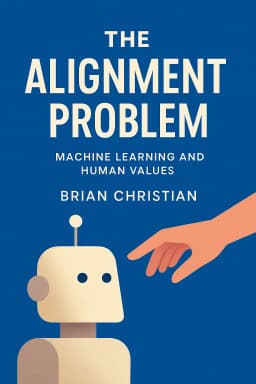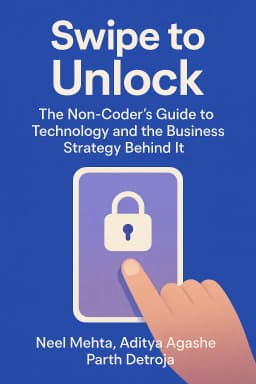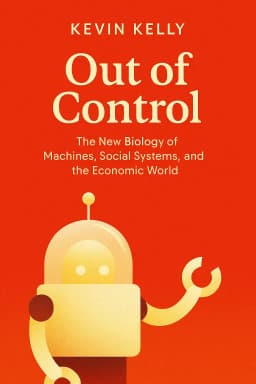
Your Digital Ghost
Golden Hook & Introduction
SECTION
Joe: That late-night click on a 'lose weight fast' ad you made last week? A computer somewhere might have just used it to flag you as a bad hire. Today, we’re exploring a world where your digital ghost makes more decisions about your life than you do. Lewis: Whoa, okay, that's a heavy start. Are you saying my browsing history is writing my resume? Because if so, my resume is mostly about vintage synthesizers and cat videos, which might not be the best look. Joe: It might be more influential than you think. And that's the entire premise of the book we're diving into today: Welcome to the Reputation Economy by Michael Fertik and David Thompson. What's fascinating is that Fertik isn't just a theorist; he's the founder and CEO of Reputation.com. He's literally building the tools for this new world, so this book is an insider's look at the machinery. Lewis: An insider's look, huh? That's both intriguing and a little unnerving. It's like getting a tour of a sausage factory from the guy who designed the grinder. But I have to ask, how can one single, random click on an ad possibly have that much power? It seems like a huge leap.
The New Currency: How Reputation Became More Valuable Than Money
SECTION
Joe: It feels like a leap, but it's happening every second. The book explains this by drawing a line between two concepts: Big Data and what the authors call Big Analysis. For years, we've heard about Big Data—this massive, ever-growing mountain of information we all generate. Lewis: Right, every search, every like, every photo we post. It’s the digital exhaust we leave behind. Joe: Exactly. But Fertik argues the game has changed. The real power isn't in just collecting the data anymore. He uses this brilliant analogy: "If Big Data is knowing that you’re sitting on a gold mine, Big Analysis is actually getting it out of the ground and turning it into bullion." It’s about interpreting the data to make predictions about you. Lewis: Okay, so it’s not just knowing I clicked the ad, it’s about what that click means. Joe: Precisely. Let's walk through the book's most chilling example: the weight-loss ad click. You're up late, you can't sleep, you're scrolling, and out of sheer curiosity, you click on a banner with some ridiculous claim. You don't buy anything, you just click. Lewis: I've definitely done that. It's a moment of weakness. The internet equivalent of looking at the junk food aisle. Joe: Well, here's what happens next, according to the book. First, you're bombarded with weight-loss ads for weeks. But behind the scenes, something far more significant is occurring. A data broker’s algorithm logs that click. It doesn't just see "interest in weight loss." It sees a click on a specific type of ad—one with unrealistic claims, served late at night. Lewis: Uh oh. I can see where this is going. Joe: The algorithm starts making inferences. A click on that ad at 2 a.m. might get you tagged with a score for "susceptibility to advertising." Maybe another score for "potential insomnia." And combined with other data points, maybe even a flag for "poor impulse control" or "potential health issues." These aren't facts; they're statistical probabilities. Lewis: That is terrifying. So a single click creates this phantom profile of me as an impulsive, insomniac person who falls for scams? Joe: Potentially, yes. And here’s the final step. A company you've applied to for a job might subscribe to a service that provides risk scores for applicants. Their automated screening software checks your score, sees these negative flags, and decides you're a less appealing candidate. You're not rejected because of your resume; you're filtered out by a reputation score you never knew you had. You just get a generic rejection email, or more likely, you hear nothing at all. Lewis: Wow. And you'd never know why. You'd just think you weren't qualified. This whole idea of a reputation score... it's like a credit score for your entire life, but it's invisible and you can't even check it. Joe: That's the perfect analogy. The book argues that these scores—job scores, customer value scores, even health scores—are the new currency. A good reputation score can get you VIP treatment at a hotel you've never been to before, just because their system analyzed your travel blog and sees you're a positive influencer. Lewis: So the hotel concierge greets you by name and offers you a free upgrade because an algorithm decided you're worth it. Joe: Exactly. But the flip side is that a bad score, generated from something as trivial as a late-night click, can silently close doors to jobs, loans, and maybe even relationships. The book mentions the tagline of one app: "Look up before you hook up." We are constantly being scored. Lewis: This sounds so dystopian. Is there any upside to this, or are we all just doomed by our search history and our moments of weakness? It feels like we're building a world with no room for error, no chance for a clean slate.
DAMM: The Invisible Hand Shaping Your Career
SECTION
Joe: It's a valid fear, and the book definitely leans into the cautionary side of things. But it also presents a powerful argument for the upside. The authors introduce this concept called DAMM: Decisions Almost Made by Machine. And while it can be used to screen you out, it can also be the force that discovers hidden talent in a way that was never before possible. Lewis: Okay, I need an example of that, because right now all I'm picturing is a robot stamping "REJECTED" on my life file. Joe: Then let me tell you one of the most incredible stories from the book, the story of Arnel Pineda. In 2007, Pineda was a singer in Manila, playing in local bars and covering classic rock songs. He was talented, but largely unknown outside of his local scene. For fun, he and his band started uploading videos of their performances to YouTube. Lewis: Just like millions of other people. A digital message in a bottle. Joe: Exactly. Meanwhile, halfway across the world, the legendary American rock band Journey was in a tough spot. They desperately needed a new lead singer who could handle Steve Perry's iconic vocals, and they were coming up empty. The band's guitarist, Neal Schon, was frustrated and started doing what we all do when we're looking for something obscure: he went down a YouTube rabbit hole. Lewis: No way. He was scouting for a lead singer on YouTube? Joe: Late one night, he stumbled upon a video of Arnel Pineda singing a Journey cover. He was floored. Pineda's voice was a dead ringer for Steve Perry's. Schon describes it in the book, saying, "I had to walk away from the computer and let what I heard sink in because it sounded too good to be true. I thought, ‘he can’t be that good.’ But he is that good, he’s the real deal." Lewis: That's the ultimate Cinderella story for the digital age! It's like winning the lottery, but the ticket was a YouTube video. Joe: It gets better. Schon tracks down Pineda, who at first thinks it's a prank. He's flown to California for an audition, and within days, he's offered the job. This unknown singer from Manila becomes the new frontman for Journey. By the end of his first year, he'd played 57 shows for over a million fans. That is DAMM in action. No agent, no manager, no traditional gatekeepers. Just pure talent, a digital platform, and an algorithm that connected the two. Lewis: That's an amazing story. It completely flips the narrative. The same force that can punish you for a stray click can also pluck you from obscurity and hand you your dream. Joe: And that's the paradox of the Reputation Economy. It's a disintermediator. It breaks down old barriers. The book tells another story about a Norwegian trick-kicker, Håvard Rugland, who had never played a down of American football. He posted a viral video of his incredible kicks, and the Detroit Lions signed him to a contract. His YouTube channel was his resume. Lewis: But for every Arnel Pineda or Håvard Rugland, how many people are getting silently rejected by these same systems? The book talks about resume screening, right? How does that work? Joe: It's the less glamorous side of DAMM. Most large companies now use Applicant Tracking Systems. Your resume is first read by a machine, not a human. This machine is programmed to look for specific keywords, qualifications, and patterns. If your resume doesn't have the right density of those keywords, a human being will never even see it. Lewis: So you could be the most qualified person in the world, but if you don't speak the algorithm's language, you're invisible. Joe: Precisely. The book’s advice is to shift your thinking. The old advice was to use action verbs. The new advice is to load your resume with keywords related to your function, role, and the technologies you use. You have to write for the machine first, and the human second. Lewis: So if we're all being scored and screened by machines, are we just passive players in this game? Or can we actually fight back and shape our own narrative?
Owning the Conversation: The Art of Reputation Warfare
SECTION
Joe: That's the final, and maybe most important, piece of the puzzle. The book argues that you absolutely can, and must, fight back. You have to be proactive. You have to own the conversation about yourself. And the best way to understand this is through the story of Hyundai in the 1990s. Lewis: Oh, I remember 90s Hyundai. It was the punchline of every car joke. The brand was synonymous with cheap and unreliable. Joe: It was worse than a joke. In the movie Glengarry Glen Ross, Alec Baldwin’s character berates another salesman by saying, "You drove a Hyundai to get here tonight, I drove an $80,000 BMW." The brand was cultural shorthand for "loser." Their sales were plummeting, and dealerships were closing. They had a massive reputation problem. Lewis: So how do you possibly come back from that? You can't just run ads saying, "Hey, we're not terrible anymore!" No one would believe you. Joe: They knew that. Arguing about their quality was a losing game. So they did something shocking. In 1998, Hyundai announced they were offering a 10-year, 100,000-mile warranty on their cars. Lewis: Wow. That's... a huge statement. At the time, most warranties were what, three years? Joe: Exactly. It was a "bet-the-company move," as their CEO called it. It was so audacious that it completely changed the conversation. They stopped trying to convince people their cars were good. Instead, they forced everyone to talk about their warranty. The new question wasn't "Is a Hyundai reliable?" It was "How can they possibly offer a 10-year warranty if their cars aren't reliable?" Lewis: That's brilliant! It's a power move. They're not defending their past; they're making an incredibly confident statement about their future. They shifted the metric of comparison to one where they were, by definition, the undisputed leader. Joe: And it worked. The press went wild. Sales jumped 82 percent in the first year. They completely rehabilitated their brand image, not by fixing the old conversation, but by starting a new one they were guaranteed to win. Lewis: I love that. It’s a lesson in strategic communication. So how does an individual apply that? I can't offer a 10-year warranty on myself. Joe: But you can frame the debate. The book’s advice is to hustle, don't get hustled. Play to your strengths. If you're a programmer who isn't great at public speaking, don't let the conversation be about your presentation skills. Make it about the elegance of your code. Build a portfolio on GitHub. Write a technical blog. Create so much positive, compelling data about your strengths that it drowns out the noise about your weaknesses. Lewis: So you proactively build your own narrative. You find your "soup can," like Andy Warhol did. He wasn't a classically trained painter, so he changed the definition of art. Joe: That's a perfect connection. You find the thing that makes you unique and you make that the headline. You become so good, so visible in your niche, that the algorithms—and the people behind them—can't ignore you.
Synthesis & Takeaways
SECTION
Lewis: It's fascinating. We're living in this world where our digital identity is this powerful, permanent, and often inaccurate reflection of us. It can open doors like a fairytale for someone like Arnel Pineda, or slam them shut for reasons we'll never even know, all because of one stray click. Joe: Exactly. And Fertik's ultimate point isn't just to be scared of it, but to be an innovator within it. The old gatekeepers—the record labels, the HR departments, the traditional publishers—are losing their power. Your reputation, if you build it and manage it, is now your access pass. The book did get some mixed reviews, with some critics pointing out it can feel like a long advertisement for his company, Reputation.com. Lewis: I can see that. It's a bit like a firefighter writing a book about the dangers of fire while also selling fire extinguishers. Joe: A fair critique. But the core insight is undeniable and incredibly relevant: you either manage your reputation, or it will manage you. The systems are already in place. The scoring is already happening. The only choice left is whether you want to be a passive subject of this economy or an active participant. Lewis: It really makes you wonder... if a machine analyzed your last 24 hours of online activity, what story would it tell about you? And would you even recognize the person in that story? Joe: This is Aibrary, signing off.









